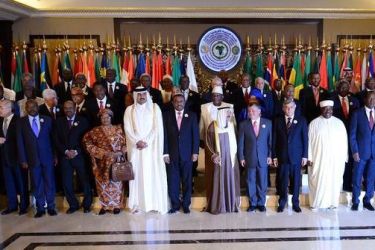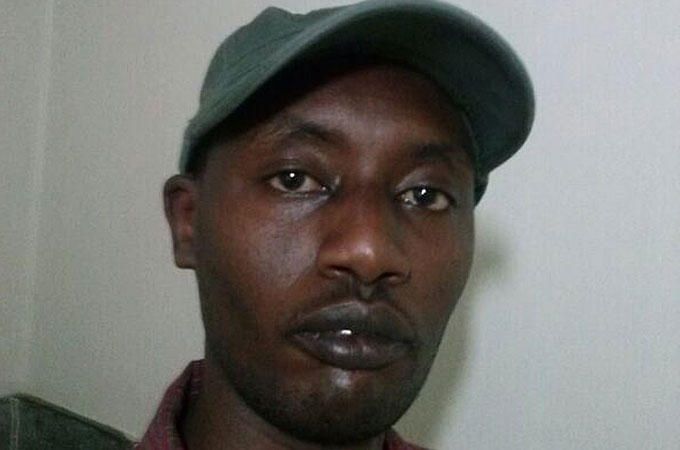Murmurs in the corridors of Afro-Arab power
With some 71 countries represented, the media’s analysis of the African-Arab Summit remains vital.

Kuwait City, Kuwait – The third African-Arab summit ended with little more than a simple declaration, and a brief press conference.
However, like most political gatherings, it was on the margins of the two-day event – which brought together 34 heads of state, seven vice-presidents and three heads of government – where most of the deal-making and difficult discussions really took place.
At least 30 bilateral discussions took place on the sidelines of the summit of 71 nations, and while the details of many are not yet known, it is only after an analysis of such informal talks that the real success of the summit can be gauged.
Al Jazeera spoke to some of the media professionals from across the countries represented at the summit – and beyond – as they mingled in the corridors of Afro-Arab power.
| Anicet Yomboranyama, Democratic Republic of Congo, Media lecturer |
“I think the summit was really well organised in terms of the form and content. They made us feel welcome from the time we arrived until the time we left.
“I think the final declaration is very clear. We have what they call the south-south cooperation for the coming years because African is a poor continent. I’m not unkind to say that.
|
“That is why Kuwait particularly thinks it is fine to finance Africa to boost the economy of the continent which needs to be able to sky-rocket.
“Africa needs to go forward and that’s why Kuwait allocated $1bn for the five coming years in order to strengthen relationships between Kuwait and African countries and mostly between Arab and African countries.
“This is something vitally important. I think these relationships will help them to keep in touch, diplomatically,
politically and socially.
“I think everything was well done, but as African journalists they should have made it possible for us to interview some African presidents and those from Arab countries – and other high level personalities. This I would have appreciated.
“I was not happy about the last press conference. We should have had the chance to interview African and Arab
leaders – not just the general secretary of the Arab League and other representatives.
“Apart from that, we now have to think about the future: How we can improve on what was done here.”
| Peter Ng’etich, Kenya, Journalist |
|
“I think this summit will go a long way in streamlining migration issues between Africa and the Arab countries.
“To add to this, I think the summit will also aid in the sharing of intelligence between Africa and Arab countries to fight terrorism.
“The $1bn loan is however quite little. considering the size of Africa.”
| Alejandra Pataro, Argentina, Graphic artist |
“I think this was a conference full of good intentions, where many heads of state got together and they all agree on good things – investment and getting together in the future to deal with different problems – but in the end I believe there are no specific recipes to attend grave issues such as poverty, terrorism, violence and war.
|
“In the end, I have the feeling that there is nothing getting solved.
“I think Africa got a big loan. That is a very good thing for Africa. There is also more money going towards research, and that is a specific thing which is the biggest issue.
“There is also an agreement on dealing with migration, and I think that also is a big issue.
“The issue of Ethiopian migrants was not mentioned. I don’t know if Syrian refugees were mentioned – and the people who are leaving African and dying in the Mediterranean Sea were not mentioned.
“But, it is a good thing that there was an agreement on something very serious.
“The war in Syria was not mentioned at all, or very little; just as the conflict with Iran was not mentioned at all.
Iran was not even here.”
| Kennedy Abwao, Kenya, Journalist |
“The timing was ideal. It came after the Arab Spring, and the increased migration of Africans into the Middle East.
|
“The summit did not give enough room for both sides to interact, though.
“Kuwait tended to dominate and it appeared at the end, that countries which think Kuwait is implementing a domestic agenda could start grumbling.
“I took note of the critical diplomatic thinking that went into the execution of outlined agenda of the summit.
“It still remains to be seen whether any of the Arabs would make any bilateral announcements to back the summit.”
| Jean Jacques Cornish, South Africa, Radio Journalist |
“The opening gambit by the Emir, to give $1bn in soft loans and a further $1bn in investment to be channelled through the World Bank was a very tough act to follow and it overshadowed the conference.
“But it is important that one understands that this was not a one-way street.
|
“The African economies desperately need investment but they do provide a possible alternative investment target for the Arab economies with investments in traditional western markets which lost so much in the global economic meltdown.
“So if the Africans can make their economies more attractive, with stability and better governance, then they would provide a very logical place for the Arab world to put its money.
“One of the things we were looking for that was mooted by the foreign ministers and by officials preparing it, was a common market.
“Clearly that is premature, so whilst we hoped something would be said about that, it wasn’t. We don’t believe enough was said about the treatment of migrant workers in the Gulf countries, and the issue of the Nile, which is really going to tear at Africa. We could have had more than that.
“It was interesting though that such heavy emphasis was laid on security and on fighting terrorism.
“Criminalising the paying of ransoms is a far-reaching thing… But these are lofty statements that come out of summits. The real work is in effecting it.”
| Victor Baatweng, Botswana, Journalist |
“The summit happened at a critical time when much of the world’s attention is shifting towards Africa.
|
“Almost every economic zone globally wants to either increase or revive their trade with Africa.
“It will be interesting to see how far the parties will go in terms of trading and investment from now and onwards.
“The $2bn soft loan to African countries will help in terms of development. Although the detailed specifications are not yet known as is how the loan will be allocated, criteria so to speak.
“Unfortunately, the language barrier was a problem. There were also too many closed sessions providing journalists with limited access to official talks.”
Follow Safeeyah Kharsany on Twitter: @Safeeyah





